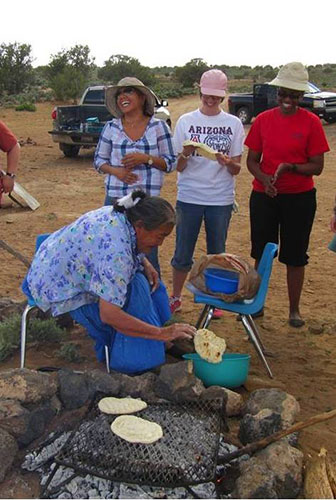Department of Health Promotion Sciences
Family & Child Health
Family and Child Health is a program based in the Department of Health Promotion Sciences. The program focuses on issues that affect families, women of all ages, infants, children, and adolescents. Coursework emphasizes family, women adolescent and child health in a US and global contexts, and policies affecting health programs and services aimed at improving family health.
Graduate Programs

FCH students on service learning trip in Navajo Nation
The MPH in Family and Child Health provides students with a curriculum that addresses the history and current status of the socioeconomic, cultural, political and physiological issues that affect families and children.
The DrPH (Doctor of Public Health) in Maternal and Child Health is an advanced, professional degree program that focuses on developing future leaders in public health practice, who will advance the public's health through the integration and application of a broad range of knowledge and analytical skills in leadership, practice, policy analysis, teaching, research, program management and professional communication. The program concentrates on the population-based study of health and health care of families, women of all ages, infants, children, and adolescents.
The Graduate Certificate in Global Health and Development is one of the flagship education programs of the Global Health Institute. Designed for professionals and those entering the field of global health, this online program is a flexible, academically rigorous option for those who wish to balance coursework and career, while maintaining an environment of utmost academic rigor. Courses meet the need for skill enhancement for both foreign and domestic individuals who have limited time to pursue a campus-based full degree program.
Unique Strengths
Faculty in the Family and Child Health section have expertise in the following areas:
- Family, maternal and child health across the globe
- Family mental health
- Health equity, particularly within Hispanic and Native American communities
- Community-based capacity building and participatory research and evaluation
- School and adolescent health
- Restorative justice for families
- Community-health workers
- Service Learning
In addition, the College of Public Health offers a small, diverse student body with a corresponding low faculty to student ratio. These factors encourage an effective advising and mentoring environment. The College and the program reflect student and research diversity, resulting in a robust learning atmosphere.

